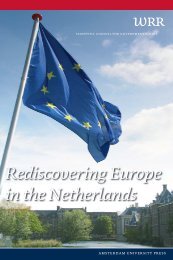The Western Condition - St Antony's College - University of Oxford
The Western Condition - St Antony's College - University of Oxford
The Western Condition - St Antony's College - University of Oxford
You also want an ePaper? Increase the reach of your titles
YUMPU automatically turns print PDFs into web optimized ePapers that Google loves.
Faces <strong>of</strong> the West: Can Europeanisation, Americanisation and Autonomisation be reconciled?<br />
version <strong>of</strong> secular Turks, the Kemalist state set out to suppress them, which ultimately led to its<br />
self-destruction. Having inherited many <strong>of</strong> the tactics <strong>of</strong> his patriarchal predecessor, it is likely<br />
that Erdoğan’s ambition to create an obedient, religious and hierarchically organised society will<br />
also stumble upon similar obstacles.<br />
History also writes <strong>of</strong> ambitious leaders who in their hubris overestimate the power they possess<br />
and underestimate the challenges they face, only to see their grand visions come apart at their<br />
feet. In this paper, we have argued that depicting Turkey as an island <strong>of</strong> stability between a<br />
‘crumbling’ Europe and a ‘smouldering’ Middle East conceals the grim state <strong>of</strong> its democratic<br />
deficits and socio-political fragilities and effectively contributes to the excessive self-confidence<br />
<strong>of</strong> its decision makers. Indeed, the island imagery should serve as a sign <strong>of</strong> caution rather than<br />
confidence: it was US President Jimmy Carter who in 1978 described, not Turkey, but Pahlavi<br />
Iran as “an island <strong>of</strong> stability in one <strong>of</strong> the more troubled areas <strong>of</strong> the world” only months<br />
before revolutionary turmoil toppled its hubristic monarch, Mohammad Reza Shah Pahlavi, who<br />
called himself Aryamehr, or ‘the Light <strong>of</strong> the Aryans’, and believed he was divinely ordained to<br />
modernise Iran from above. 191 We neither forecast as tumultuous a prospect for Turkey, nor a<br />
similarly ominous fate for its leader, who unlike the Iranian strongman continues to enjoy a<br />
substantial level <strong>of</strong> democratic legitimacy. That said, the suggestion that a country like Turkey,<br />
which has unresolved societal fault lines <strong>of</strong> its own and is deeply invested in the economic and<br />
political infrastructure <strong>of</strong> its various neighbourhoods, can remain immune to changes <strong>of</strong> such<br />
pr<strong>of</strong>ound scale comes across as dangerously arrogant or, at best, extremely naïve.<br />
Thus, we have argued for a more humble political rhetoric in Turkey that focuses on healing the<br />
country’s own social and historical wounds rather than exploiting those beyond its borders for<br />
the sake <strong>of</strong> its regional leadership ambitions. We have objected to the promotion <strong>of</strong> Turkey by<br />
the US foreign policy establishment as a ‘moderate Islamist’ model to the Middle East, as this<br />
discourse is more about what Turkey can do for the US in the region rather than what it could<br />
stand for in the different geographical scales <strong>of</strong> its presence. We believe that a Turkey that truly<br />
embodies the democratic institutions and the socio-political peace and stability that it claims to<br />
represent now would serve as an inspiration to its neighbours in all directions. Yet, what is the<br />
likelihood <strong>of</strong> such an inspirational turn, given the realities on the ground?<br />
191 Mohammad Reza Shah wrote: “When I remembered the various episodes when I had had miraculous escaped<br />
from death, and noted the fact that during my reign my country had also miraculously been saved from ruin, I<br />
became aware that my mission to my country was not completed yet. I will frankly confess that I was convinced that<br />
God had ordained me to do certain things for the service <strong>of</strong> my nation, things that perhaps could not be done by<br />
anyone else. In whatever I have done, and in whatever I do in the future, I consider myself merely as an agent <strong>of</strong> the<br />
will <strong>of</strong> God, and I pray that He may guide me in the fulfilment <strong>of</strong> his will, and keep me from error.” Mohammad<br />
Reza Pahlavi, <strong>The</strong> White Revolution <strong>of</strong> Iran, translated by the Imperial Pahlavi Library (Tehran: Kayhan Press, 1967), p.<br />
16.<br />
72

















